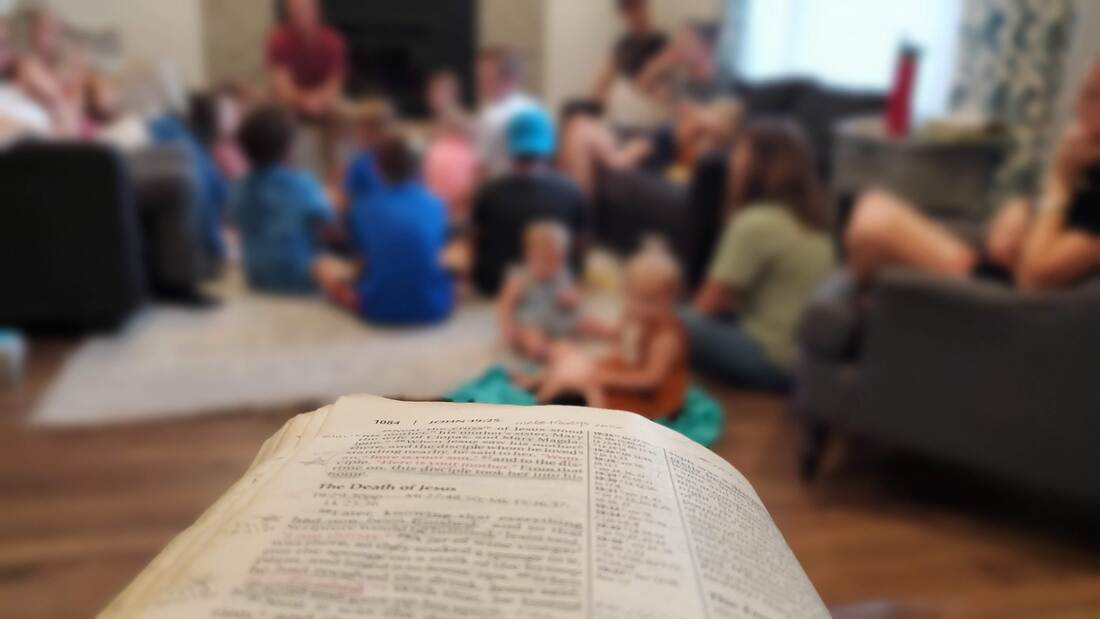|
9/24/2023 0 Comments September 25, 2023Teaching | Mission Update & Prayers
watch above/read below
This Week's Teaching: "The Forgiving & Punishing God"
When God described himself to Moses in Exodus 34, he said that he forgives wickedness, rebellion and sin. But THEN he said that he doesn't leave the guilty unpunished. How do we make sense of that? I think there are two ways to understand this, but they're not either/or, they're both/and. Let's get to know the forgiving and punishing God.
TRANSCRIPT
So, imagine God comes to you and he takes your face in his hands and he says, listen to me. I am the Lord. I'm the Lord. That's my name. Yahweh, Yahweh. I'm not some impersonal force. I am the personal God. I am Yahweh. I am the Lord, the Lord. You can know me. And then he says, let me tell you about myself. I am the compassionate and gracious God. I am kind. You can trust me. And he says, I am slow to anger. I am patient. I don't want anyone to perish. I am patient so that everyone has opportunity to turn their lives around and get right. I am kind. I am patient. I'm slow to anger. And I am abounding in love and faithfulness. I love you so much. I love you so much. I am the loving and faithful God. I maintain love to thousands and I maintain love to you. I am good toward you. I am inclined toward your good. I am full of love and faithfulness. You can love me. You can count on me. And then he says, And I am the forgiving God. I forgive wickedness, rebellion and sin. Anytime that you have chosen to do what is wicked -- something that's not good, that's evil -- chosen wickedness, I'm inclined to forgive you. And anytime you have rebelled against me, knowing that I said one thing and you've done another thing, I am inclined to forgive you. And any time you have erred, any time you have sinned, any time you decided you weren't going to do something and you did it anyway, or any time you decided that you were going to do something and you failed to do it, I forgive sin. I am inclined to forgive you. I am inclined to forgive wickedness and rebellion and sin. That is my nature. What if God came to you and said that? What if God came to you and described himself to you that way? You would be enthralled. You would be filled with joy. You would be ready to turn toward him with anything that has been turned away from him. This is God. Yahweh, Yahweh, the Lord, Lord, he's kind, he's patient, he's good, and he's forgiving. He's forgiving. But then what if he said, Oh, I also punished the guilty. I will not leave the guilty unpunished. In fact, I punish the children and their children for the sins of the parents to the third and fourth generation. I'm a forgiving God, but I'm a punishing God. I will not leave the guilty unpunished. What would you do with that? There's two ways we can hear it. If he's saying that I forgive wickedness, rebellion and sin, but I will not leave the guilty unpunished, we could say the difference is people who ask for forgiveness or people who persist in guilt. We could say that, that forgiveness absolves the guilt. We could say that and that would be true. One John one says, "If we confess our sins, he is faithful and just and will forgive us our sins and purify us from all unrighteousness." This is our God that is not punishing the guilty for their sins. It's forgiving and purifying them from their sins. And this is a clear, true way to read it. But even with that, if there is forgiveness through repentance, and yet God punishes the children and their children for the sins of the parents to the third and fourth generation, does that mean that if my grandparents failed to ask forgiveness that God is going to punish me? What's with that? Or if I ask forgiveness, then somehow my kids don't have to pay for it. I think the second way we can hear this -- like, not to take at all away from the fact that there is forgiveness and that those who seek God's forgiveness are not punished as guilty. They will inherit eternal life. They are freed from the penalty of death. All that. That is slam dunk, done, deal. But, there's another way to read this, an additional way to read this, that God has woven wisdom into the fabric of creation. And part of that wisdom is that we reap what we sow. And so if someone commits an act of wickedness, they will experience things they're not supposed to experience and they will live with the consequences of that for the rest of their life. Now they may seek forgiveness. You may seek forgiveness and be granted forgiveness. You won't die in your sin, but you will live out the consequences of that choice. Someone who persists in wickedness will live with multiplied consequences of those choices. And they may, on their deathbed, or they may, at age 30, ask God to forgive them for all the wickedness they've done. And He will forgive them, and yet they will live out the consequences for as long as they're here. They will live out the consequences of that wickedness and their children and their children will live out the consequences for the choices to persist in wickedness. Or rebellion. If you walk down the rebellious path, you will end up in places that God said, don't go, and you will experience the consequences of that. The guilt of that action will bear punishment for you because God has sown wisdom into the very fabric of creation, and we reap what we sow. And so if you walk down the path of rebellion, not only will you suffer the consequences of that, but your children and their children will, because we wear out paths in rebellion and it's hard to get back out. Now you can ask God to forgive you and he does. He will free you from the penalty of eternal death. He will give you eternal life. He will even relate to you as if you are pure with him. He will forgive you. He will reconcile himself to you and he will reconcile you to himself. He will redeem you. All that. And yet you will likely need to live out the punishment of that guilt. And if you sin, if you decide to do something and don't do it, or if you decide not to do something and you do it anyway, and you err and you sin, you can call out to God and he'll forgive you for it. But the actions bear consequences. You reap what you sow. And so we can read this, that God allows our decisions to bear the consequences that they bear. We reap what we sow. And this is true. Is it unfair of God to let that happen? No, the opposite would be that anyone can do the worst things imaginable and they simply say a prayer and suddenly it undoes everything. And that would be to take away our free will. And God has -- whether you like it or not -- God has chosen to not take away your free will. And because of that free will, you get to sow good or bad. And because of that, you get to reap good or bad. You reap as you've sown. And so God, he comes to you, he takes your face in his hands and he says, I'm the Lord, I'm the Lord, you can know me. I'm kind. I am the compassionate and gracious God. This is my nature. And I'm slow to anger. You experience my patience that I haven't wiped you off the face of the earth. You experience my patience every day. That is so that you can be right with me. That you can turn from your sin, because I don't want anyone to perish. I am God. I am kind. I am patient. And I'm good. I am abounding in love for you. And I am faithful to the nth degree. And I am inclined to forgive you. I'm inclined to forgive you. Even if you may need to live out the consequences on this earth of the decisions you've made, I forgive you. I forgive you. And I will give grace to you to make amends. I will give grace and wisdom to your children to make right what you made wrong. And I will give grace and wisdom to their children to continue the process as you and your family "choose this day whom you will serve: we will serve the Lord." And if you find yourself paying for the consequences of your parents or their parents, God gives you grace and wisdom because he is God. He is kind. He is patient. He is good. And he forgives. And so now as you have time, turn to him, turn to him. And be forgiven and be reconciled. This is our God. And this completes Exodus 34, where God spoke to Moses and revealed himself. This is the God that we serve and that we have always served. This is "the LORD, the LORD." And Jesus is the exact representation of his being. Colossians 1. "God was pleased to have all his fullness dwell in Jesus and through him to reconcile to himself all things, whether things on earth or things in heaven, by making peace through his blood shed on the cross. Once you were alienated from God and you were enemies in your minds because of your evil behavior. But now, God has reconciled you by Christ's physical body through death to present you holy, in His sight, without blemish, and free from accusation, if you continue in your faith, established and true, and do not move from the hope held out in the Gospel. This is the Gospel..." The LORD, the LORD. He can be known. He is kind. He is patient. He is good. He loves you with all that he is. And he is inclined to forgive you. Turn from sin. Turn to him. And he will make you holy and pure and blameless and free from accusation. This is our gospel. This is our gospel. Turn to the Lord through faith in Christ. Amen. Mission Update: Portland, Oregon
0 Comments
9/18/2023 0 Comments September 18, 2023Teaching | Mission Update & Prayers
watch above/read below
This Week's Teaching: "God is Good!"
So this is week four, looking at how God describes himself.
We've been looking at Exodus 34:5-8, where God comes to Moses and he says of himself, "the LORD, the LORD (Yahweh, Yahweh), the compassionate and gracious God, slow to anger, abounding in love and faithfulness." We've already looked at how when he said, "Yahweh, Yahweh," he said, "I am your God. I'm who I am. And you can know me." And then he said, "I am kind." Then he said what we saw last week, "I am patient." And this week we'll see how he describes himself as good. Now in the passage that I just read, the translation I just read, He describes himself as "abounding in love and faithfulness." Now, I could say that God describes himself as loving and I could say that he describes himself as faithful. But the way we relate to loving has mixed meanings for us. And the way we relate to faithful has some mixed meanings, and so I'm saying God is good. And that'll make sense as I explain. Now, if I told you God loves you, that's a welcomed thing. If someone tells me "God loves you," oh, that's such good news. But what if he's bad? What if he's bad and he loves me? That's not so good news. Like, what if he's malevolent? What if he's not good natured and he loves me? That becomes actually bad news. That becomes something I need to be afraid of. So God loves you, but what if he's bad? What if he's malevolent? Or what if he is benevolent? What if he is goodwilled, but he's just bad at loving? What if he's not good at it? What if he means well, but is unreliable in his love? Again, that's bad news. That's not good news. And so if I tell you, God loves you... What is he like? I'm saying he is good. If God is not trustworthy, He is not loving. And if God is not loving, He is not trustworthy. But if God is not good, He is neither loving or trustworthy. And so I'm saying God is good. Let's lean into this. Let's pick apart the loving and the faithful and you'll see why it means good. Now, when God describes Himself as abounding in love, the abounding is plenteous. It's abundant. It's enough. It's more than you could ever need. He has that much love for you. But what is love? In some of the translations, it would be described as good. Some would describe it as loving-kindness. This is love. We might relate to love as affection, because that's how we relate to others; "I have such affection for you." And I would say it's true that God has affection for you. But when he describes himself as abounding in love, it's not abounding in affection. That can come and go. If you become less than lovable, affection can come and go. But when he says, I am abounding in love, he says, I have more love for you than you could ever need. And that kind of love can be described as not just enjoyment of us, but goodness and kindness for us or toward us. He is abounding in love. He has more love for you than you would ever need. He redeems us from our enemies. He redeems us from our troubles. He redeems us from sin. He keeps his covenant with us. He is merciful toward us. He has good deeds toward us. And some of this overlaps with what we looked at in the second week on this. In 1 John, we read about God's love when we read, "God is love." This is 1 John 4. Read this and just, wherever there's "love," put a heart around it or something like that, and you'll just see how often John talks about love in this. And he says, verse seven, "Dear friends, let us love one another for love comes from God. Everyone who loves has been born of God and knows God. Whoever does not love does not know God because God is love. This is how God showed his love among us. He sent his one and only Son into the world that we might live through him. This is love, not that we loved God, but that he loved us and sent his Son as an atoning sacrifice for our sins. Dear friends, since God so loved us, we also ought to love one another." Verse 16, "God is love." That's the second time John says it: "God is love." We could read on and on and on. God is love. He is abounding in love for you. And this is how he showed his love for us. He gave his Son as an atoning sacrifice for your sin... He, being very God became flesh and lived for awhile among us so that he could die our death, and defeat death, and be raised to life to give life to whoever would choose it. He loves us that much that he paid our penalty. He wouldn't have had to. He did it by his choice. He is abounding in love for you. But not just abounding in love. He is abounding in faithfulness. When we think about faithfulness, let's not think so much about how we might use it in our relationships. When you think of this kind of faithfulness of God, don't think so much of fidelity, as we might in a marriage -- faithful in marriage, fidelity in marriage. If I describe myself as faithful to my wife, people would understand that means fidelity to her. Or if I might describe myself as faithful to a certain group of people, I am loyal to that group of people. We recognize it as that. But when God says he's abounding in faithfulness, let's not hear it quite so much as fidelity and loyalty, although it has elements of that, but let's hear it more as trustworthy and true. Trustworthy; he can be relied upon. And true to himself; true to truth. He is true. He's not wavering. He represents stability, continuance, truthfulness, rightness. In a word, he is trustworthy. He's faithful. He is abounding in faithfulness. He is trustworthy. In 2 Timothy, Paul describes God and says, "Here is a trustworthy saying, If we died with him, we will also live with him. If we endure, we will also reign with him. If we disown him, he will also disown us. If we are faithless, he remains faithful for he cannot disown himself." He is faithfully who he is. He's abounding in love and faithfulness. He is trustworthy. He is good. Like I say, if he's not trustworthy, he's not loving. And if he's not loving, he's not trustworthy. But if he's not good, he's neither loving or trustworthy. He is good, because he's abounding in love and faithfulness. In Psalm 145, this Psalm of David, he mentions the same phrase of Exodus 34 and other places where God describes himself. And this is verse 8. "The Lord is gracious and compassionate, slow to anger and rich in love..." And so this is that same concept. It says, "The Lord is good to all. He has compassion on all he has made." And David says, "All your works praise you, Lord. Your faithful people extol you. They tell of the glory of your kingdom, and they speak of your might, so that all people may know of your mighty acts and the glorious splendor of your kingdom." He says, "Your kingdom is an everlasting kingdom. And your dominion endures through all generations." And then he writes this: "The Lord is trustworthy." "The Lord is trustworthy in all the promises, and faithful in all he does. The Lord upholds all who fall and lifts up all who are bowed down." He says, "The eyes of all look to you and you give them their food at the proper time. You open your hand and you satisfy the..." -- listen to how good God is -- "you open your hand and satisfy the desires of every living thing. The Lord is righteous in all his ways and faithful in all he does. The Lord is near to all who call on him, to all who call on him in truth. He fulfills the desires of those who fear him. He hears their cry and saves them. The Lord watches over all who love him, but all the wicked he will destroy." Now we'll get to that in a week or two. The punishing God. That's a part of this. But listen: "The Lord watches over all who love him... He hears their cry... He saves them... He fulfills the desires of all who fear him..." Then David says, "My mouth will speak in praise of the Lord. Let every creature praise his holy name forever and ever." Do you believe God loves you? Do you believe he is trustworthy? And probably, the people I'm talking to would say yes, he loves me, he is trustworthy. But let me ask you this: Do you believe he's good? Do you believe he is good? That when he loves you, he's not bad, and he's not bad at it; he is good. And when he is faithful, when he is trustworthy, he is good. Do you believe, not just that he loves you and is trustworthy, do you believe that God is good? To his core, good? This is God's self revelation: I am God, you can know me. I am kind, you can trust me. I am patient, repent while there's time. And I am good, so you can love me. If you've ever loved someone who was bad, who was malevolent, who was not "worthy" of love, you know how painful that is. But God is good, and so you can love him. Apply yourself to loving God this week. It's the essence of worship. Make sure that you know God. Amen. Mission Update & Prayer
9/10/2023 0 Comments September 11, 2023Teaching | Mission Update & Prayers
watch above/read below
This Week's Teaching: "God is Slow to Anger , but for How Much Longer?"
If you say to someone, "Don't be angry with me," you can say it either as, "Don't you be angry with me," or you can say it as, "Please don't be angry with me."
The first one, "Don't you be angry with me," is this insinuation that you have no right to be angry with me either because I did nothing wrong or, looking at you, you know, you're no better than I am. " Don't you be angry with me." On the other hand, if it's, "Please don't be angry with me," it's this admission of guilt and that, "Yes, you have every right to be angry with me, but please have mercy. Please be patient with me." When God revealed himself to Moses, he said -- we've been looking at this the last few weeks -- he said in Exodus 34, " I am who I am. I am God. And so you can know me." And then he said, "I'm full of mercy and compassion." And I said last week, that's like saying, "I'm kind." So "I am God; you can know me." And "I'm kind; you can trust me." And then he said, "I am slow to anger." Slow to anger. And the word I'm giving that is: Patient. God says, "I am God, I am kind, I am patient." Question: Is patience strong or weak? Like, how do you normally think about it? Is patience strong or weak? Like I've had people say, "Well, you're way more patient than I would be." And it's almost like this insinuation that, "You're way weaker than I would be. I would never let someone get by with that. You are way weaker than I would be." Is patience weak? Or I've had people say, " Wow, I don't know how you can stay so patient." And it's sort of like this sense of, "You are strong enough to be patient." Like, how do you relate to it? Is patience strong or weak? As I've thought about it, it depends on the context, whether I think of it as patient or weak. If it's being patient with a child while they learn to walk, that's strong. Or even being patient with a child while they learn obedience to a parent. In that context, patience is strong. And even where it's with peers, if it's patience with a spouse, as they learn to live respectfully in close quarters with another, that's strong. Like, please be patient with me. I'm trying. That is strong. Patience is strong. But if it's patience with an abuser while they try to abuse you, or if it's patience with a thief while they try to steal from you, I don't think patience is strong. I relate to that as weak. It's being reluctant to take action where action should be taken. Patience is sometimes strong and sometimes weak. I mean, it depends on the context. And it also depends on who is the one being patient. If we talk about a two year old throwing a temper tantrum with their mom, we get that. That's one kind of impatience. But if we talk about a judge patiently listening while you make a thorough defense before they pass judgment, well, that's a strong patience. And so it depends on the context of what we mean. Like, is patience weak or strong? It depends on the context and it depends on who the person is being patient. God says, "I am slow to anger. I am patient." We read it in Exodus 34. "The LORD, the LORD (Yahweh, Yahweh), the compassionate and gracious God, slow to anger." He's slow to anger. Now it's tempting to say, Oh, he doesn't get angry with us. God, he knows what we're like. He just kind of gives us a buy. He's like, "Nah, you and me, we're good. I get you. We're fine." Like that kind of a God never gets angry at anything. But, if we talk about a God who is slow to anger, we're talking about a God who does get angry. We're talking about a God who does get angry. In fact, slow to anger only means something if God does get angry. And it's only meaningful if slow to anger is not about temper tantrums, but it's actually about judgment. God describes himself as slow to anger. Romans 2. In Romans 2, Paul says, "Do you think you will escape God's judgment? Or do you show contempt for the riches of his kindness, forbearance and patience, not realizing that God's kindness is intended to lead you to repentance?" He says, "But because of your stubbornness and your unrepentant heart, you are storing up wrath against yourself for the day of God's wrath when his righteous judgment will be revealed." Then he says this Romans 2:6. Know this verse; this is true. "God will repay each person according to what they have done." He will repay each person according to what they have done. "To those who by persistence in doing good seek glory, honor, and immortality, he will give eternal life. But for those who are self seeking, and who reject the truth and follow evil, there will be wrath and anger. There will be trouble and distress for every human being who does evil, but glory, honor, and peace for everyone who does good. For God does not show favoritism." God will repay. So he is slow to anger, but he will get angry. In fact, as we keep on working through Exodus 34, we'll get to that part where he says he is a punishing God. We'll get to that in more depth. But for today, he's slow to anger, which means he will get angry. It doesn't mean he won't be angry. It says that he is slow to anger. He's not quick-tempered. He's not quick-tempered. In Proverbs we are challenged to not be quick-tempered. This is the wisdom of God and we learn it from God. In Proverbs 14:17, "a quick tempered person does foolish things. And the one who devises evil schemes is hated." And verse 29. " Whoever is patient has great understanding, but one who is quick-tempered displays folly." We learn this from God. We are not to be quick-tempered, and He is a God who is slow to anger. He is not quick-tempered. He is patient. He's patient, but He will get angry. Wrath is coming for all who choose evil. He will repay everyone according to what they have done. In 2nd Peter there's so much that we could read about this. Spend time in 2nd Peter. I mean, 2nd Peter is beautiful. It starts off by saying, "His divine power has given us everything we need for living a godly life." That we can actually "participate [with him] in the divine nature." And it says, because of these things, "make every effort to add to your faith, goodness," and all those things. Read that. That's first chapter. But there's also this warning in 2nd Peter two and three, which I'm just going to read parts through it, just skipping down through. I would suggest that you spend time dwelling on it more than I want to in this format. But just reading through here: " For if God did not spare angels when they sinned, but sent them to hell, putting them in chains of darkness to be held for judgment; if he did not spare the ancient world when he brought the flood on its ungodly people, but protected Noah, a preacher of righteousness and seven others; if he condemned the cities of Sodom and Gomorrah by burning them to ashes and made them an example of what is going to happen to the ungodly; and if he rescued Lot, a righteous man who was distressed by the depraved conduct of the lawless.... If this is so, then the Lord knows how to rescue the godly from trials and to hold the unrighteous for punishment on the day of judgment. This is especially true of those who follow the corrupt desire of the flesh and despise authority." He says, "They will be paid back harm for the harm they have done..." He says, "Blackest darkness is reserved for them..." They're "slaves of depravity." He says, "Dear friends, I've written these things as reminders to stimulate you to wholesome thinking." And then he says this: "You must understand that in the last days, scoffers will come scoffing and following their own evil desires. They will say, 'Where's this coming he promised? Ever since our ancestors died, everything goes on as it has since the beginning of creation!'" And Peter says, "But they deliberately forget that long ago by God's word, the heavens came into being and the earth was formed out of water and by water. By these waters also the world of that time was deluged and destroyed. By the same word, the present heavens and earth are reserved for fire, being kept for the day of judgment and destruction of the ungodly." Then he says, "But do not forget this one thing, dear friends." He says, "with the Lord, a day is like a thousand years and a thousand years are like a day. The Lord is not slow in keeping his promise as some understand slowness. Instead, he is patient with you." Like he said in Exodus 34, "I am slow to anger." Peter says, " He is patient with you, not wanting anyone to perish, but everyone to come to repentance." He's slow to anger, not because he won't bring judgment, but because he wants everyone to have opportunity to repent. And Peter says, "The day of the Lord will come like a thief." When it comes, there will be no warning, it'll surprise us, it'll overtake us, and everyone who's not ready will be shocked and awed by it. And those who are ready will say, my reward is here. "The day of the Lord will come like a thief. The heavens will disappear with a roar." You know, everyone is talking about this these days. Is the Lord's return imminent? Yes. Do we know when he's coming? No. Should we be ready right now? Yes. Yes. I think I'll talk another time about signs and wonders and the possibility of deception in that, but right now, listen. This will happen. This is how it will be. The Lord is slow to get angry, but one day -- just like a thief breaks in at a time you're not expecting him -- the day of the Lord will come like a thief, the heavens will disappear with a roar, the elements will be destroyed by fire, and the earth and everything done in it will be laid bare." It'll be over. It'll be done. If we're still walking this earth, we will suddenly be done and we will suddenly face God. He's slow to anger, he's patient, but one day he will bring judgment. And it will be sudden and it will be with finality. Once the elements are destroyed, there's no going back. Once the earth is laid bare, once the heavens disappear with a roar, there's no going back. He's slow to anger, but he's not slow in keeping his promise. And one day he will come and he will rescue all of us who've put our faith in him. And he'll bring judgment on all who rejected him. That's how it is. And Peter says, "Since everything will be destroyed in this way what kind of people ought you to be? You ought to live holy and godly lives as you look forward to the day of God and speed it's coming." I was reading this and reflecting on it: "live holy and godly lives as you look forward to the day of God." Now we live in this world where we are all lamenting the passing away of things, whether it's climate change, whether it's the earthquakes, whether it's the fires, whether it's the hurricanes... whatever it is, we all have this sense that the earth is groaning and it's getting ready to give up. And we lament it, we mourn it. And we should take care of creation, absolutely, this isn't about that. But Peter says, "You ought to live holy (devoted to God, sacred, set apart, holy) lives, and godly lives, like he says in chapter one, "You may participate in the divine nature, having escaped the corruption in the world caused by evil desires." Where he says, "make every effort to add to your faith, goodness, and to goodness, knowledge, and to knowledge, self control, to self control, perseverance, and to perseverance, godliness, and to godliness, mutual affection, and to mutual affection, love." He says, so what kind of people ought you to be? You ought to live holy and godly lives "as you look forward" -- lean in toward the day of God, his judgment, and "speed it's coming." He's slow to anger, but one day it will be sudden and it will be with finality. He will call all this to account. And we are to live holy and godly lives and look forward to that day, not with an eagerness to see our enemies perish, but like with this eagerness to see God fulfill his promise. And when he does bring justice on the righteous and the unrighteous, it will be what is fully, completely right. And just. And we will all answer to him according to what we've done; he will reward each person according to what they've done. He says, "That day will bring about the destruction of the heavens by fire and the elements will melt in the heat. But in keeping with his promise, we are looking forward to a new heaven and a new earth where righteousness dwells . And so he says, dear friends, since you are looking forward to this, make every effort to be found spotless, blameless, and at peace with him. Bear in mind..." -- and remember: "I am slow to anger, I am patient" -- "Bear in mind that our Lord's patience means salvation." Our Lord's patience means salvation. " Therefore, since you've been forewarned, be on your guard so that you're not carried away by the error of the lawless, and fall from your secure position. But grow in the grace and knowledge of our Lord and Savior Jesus Christ. To him be glory both now and forevermore." He says, "Amen!" God is slow to anger. He's patient. And our response to this is that we recognize that His patience means salvation. So my appeal to you is while God is being patient, while he is being slow to anger, recognize that this isn't the eternal delay of his anger. This is just the temporary delay of his anger. He will bring judgment. But in the meantime, he is saying to you, " If you are pursuing evil or wickedness, or even just your own desires," he says, "repent! Repent now!" Repent, because one day, and it could be today, it could be tomorrow. It could be soon. He says, "One day I'm bringing all this to account and what you have chosen is what you will be rewarded." If you have chosen to pursue godliness and honor and immortality, you'll receive eternal life. Put your faith in Jesus. Confess your worthlessness, confess your sinfulness and bow before God. Put your faith in him because, he is God; he can be known. He is full of mercy and compassion, he's kind; he can be trusted. Put your confidence in him. But, if you're someone who says, "Nope, I just want to do it my own way," recognize that one day that will be the end of you, with great pain, great sense of loss. And that is coming. You will suffer the consequences of your own decisions right now. Right now. So my appeal is: repent. And repent doesn't mean wallow in self pity. And it doesn't mean just speak bad about yourself, hoping that God will say, "Well, no, you're not really that bad." Don't do that. Repent doesn't mean beat yourself up. Repent means beat your chest in remorse and say, "Lord, forgive me. I'm so sorry." It's like Jesus talked about the despised tax collector and the Pharisee. And the Pharisee stood with his chest puffed out before God and said, "I thank you God that I'm not like all these other sinners. I thank you, Lord, that I am more worthy of your love. I thank you that I'm special." And the tax collector stood off at a distance and beat his chest and said, "Lord, have mercy on me. I'm a sinner." Don't beat yourself up. Beat your chest and show remorse. "God, I'm sorry." And then beat your body and make it your slave. Like Paul says in 1 Corinthians 9, "I beat my body and m ake it my slave, so that I won't be disqualified." Repent. Turn from the things that would incur God's wrath, that have incurred His wrath, even though He is being patient. Turn from the things that make you worthy of his wrath and let him bring freedom. Let him fill you with peace. Let him make you holy and godly. Okay, Exodus 34, "I am Yahweh, Yahweh, I am who I am, I am God, I am always present to you, you can know me. I am kind. I'm full of mercy and grace and compassion. I'm kind. You can trust me. And I am slow to anger. I am patient. Repent. Repent. I have given you time. And I won't give you time forever. I am being patient with you, and it is so that you can come to salvation." God says that's what I want of you, because that's who I am. Romans 2. "Don't show contempt for the riches of His kindness, forbearance, and patience, but realize that God's kindness is intended to lead you to repentance." Respond to that. Next week we'll look at his next statement. He says, "I'm abounding in love and faithfulness." This is our God. This is why we love him. This is why we serve him. And this is why I want to make sure that you are reconciled to him in every way. Amen. Mission Update & Prayer
9/3/2023 0 Comments September 4, 2023Teaching | Mission Update & Prayers
Watch above/Read below
This Week's Teaching: "God Isn't Always Nice But He Is Always Kind"
There's a difference between nice and kind. A nice person is pleasant and polite. They will spare the truth in order to spare your feelings. A kind person does acts of good and they will hurt your feelings in order to spare you even greater harm.
Last week we started talking about how God described himself to Moses. And we read in Exodus 34 where the Lord came down to Moses in the cloud, and he stood there with him and proclaimed his name: the Lord (Yahweh). And it says, "He passed in front of Moses, proclaiming: the LORD, the LORD, (Yahweh, Yahweh)." Then he describes himself as "the compassionate and gracious God." Now that's what we're gonna deal with today, but just so we have it all in context, and we know where this is going, he says, "Yahweh, Yahweh, the compassionate and gracious God, slow to anger, abounding in love and faithfulness, maintaining love to thousands, and forgiving wickedness, rebellion and sin. Yet he does not leave the guilty unpunished." That's the context. Today we're dealing with that second statement. Now, last week I talked about how God revealed himself to Moses, even going back to Exodus 3. He said, "I AM who I AM ," meaning, "I always have been who I have been, and I always will be who I always will be. I. I AM. I am the root and cause and the sustainer of everything. There is none other but me. I AM. I'm self-sustaining. I AM the LORD." And we connected that to this sense of his name. Yahweh. Yahweh. In the Hebrew it sounds a lot like "I AM." Yahweh. He revealed himself to Moses and he said this is my essence: I am the one who was, who is and always will be. I am Yahweh; that's my name. And then he says in my relationship with you, I am the God of your fathers, and I'm your God. This week he reveals himself as "the compassionate and gracious God." now both of those words have some overlay in their meaning and how we might translate them into English, and they carry this sense of "showing favor, being gracious, yearning towards, longing for, being merciful, being inclined towards." It gives this sense of "bending or stooping in kindness towards someone who is inferior." Not like looking down on them, condescending, but technically condescending; coming down to; descending from a place that is superior to someone who occupies a space that is inferior. Again, this isn't the insult, this is just the reality. Condescending, coming down, stooping down; as if someone who stoops down to a child in order to show kindness, to be at their level. The words "gracious and compassionate," it has this sense of mercy, of pity. And not pity that's insulting. But a condescension, a stooping down, a showing kindness, granting favor. So I'm wrapping up that "gracious and compassionate and merciful" and I'm just saying, when he revealed himself, he said, "I am kind. I AM Yahweh, the LORD, God; I am kind." If you believed God was kind, would it change how you relate to him? Whether you relate to him, whether you call out to him. In Jonah, the book of Jonah, God taps Jonah on the shoulder and says, I want you to go to the people of Nineveh. The Ninevites were brutal toward the Jews, they were enemies. And God says, I want you to go and tell them that if they don't repent, I'm going to come and destroy them. And Jonah resisted. But he eventually went and he proclaimed to the Ninevites. He says, "Forty more days and Nineveh will be overthrown." Prophetically, he says, "God is going to overthrow you because of your sin." But "the Ninevites believed God, a fast was proclaimed, and all of them from the greatest to the least, put on sackcloths. And when Jonah's warning reached the king of Nineveh, he rose from his throne, took off his royal robes, covered himself with sackcloth, and sat down in the dust, and he issued this proclamation: by the decree of the king and his nobles, do not let people or animals, herds or flocks, taste anything. Do not let them eat or drink." He proclaimed a fast. "But let people and animals be covered with sackcloth. Let everyone call urgently on God. Let them give up their evil ways and their violence." And the official proclamation said, " Who knows? God may yet relent and with compassion, turn from his fierce anger so that we will not perish." And the Book of Jonah records that "When God saw what they did and how they turned from their evil ways, he relented and did not bring on them the destruction he had threatened. But to Jonah, this seemed very wrong, and he became angry and he prayed to the Lord," and he says, "isn't this what I said, Lord, when I was still at home? That is why I tried to forestall by fleeing to Tarshish," Jonah said. He said, "I knew that you are a gracious and compassionate God. Slow to anger and a bounding in love. A God who relents from sending calamity." This is the nature of God. He's kind. Now in Romans 11:22, Paul says, "Consider the kindness and sternness of God." God is not just nice. He's not just pleasant and polite. He is demanding. He does call us to what is best and tries to protect us from serious harm. He risks offense. He hurts our feelings in order to spare us from great harm. He's not nice, but he's kind. And he's stern, as we'll look at in coming teachings that yes, he is a punishing God, but he's kind. He's kind. In fact, even when we look at how Jesus related to people, he wasn't always nice. He was kind, but he wasn't always nice. In our house church, we were studying one of the stories in the gospels, and I always ask the question, after we read things, " Does this create any tension for you?" And someone said, "You know, I really think that I would've been nicer than Jesus there." And at first we think, "Oh, you're not allowed to say that!" But I do believe that's true. Many of us would be nicer than Jesus. He called people out. He told them truths they didn't want to hear. He spoke their condemnation -- the condemnation that they themselves had chosen, but he named it in a way that allowed it to rest on them. He wasn't always nice. He was always kind. He was always calling people to something greater than just leaving them comfortable in their sin. Consider then the kindness and sternness of God. In Titus 2, we read that the grace of God has appeared to all people and it offers salvation to everyone, and it teaches us to say no to ungodliness. The grace of God, the kindness of God. If you believed that God was kind, would it change how you relate to him? I think a lot of people think that God is actually unkind and that it's their job to protect themselves from God, from this unkind God. That this unkind God is inclined away from them rather than toward them; is inclined to show disfavor rather than favor toward them; that this unkind God is just waiting to catch them in a bad situation so he can say, "See, I got you." I think a lot of people think that God is unkind. When God described himself to Moses, he said, "I'm kind; I'm kind." And so I want to encourage you, relate to God as if he's kind. In the same way that if we believe that he is the I AM -- he is -- then yes, we want to know Him, who he really is. He is Yahweh. And if we relate to him as genuinely kind, we will trust him. We will trust him. So my challenge to you as you chew on this in this coming week, relate to God as if he's kind, as if he is condescending to you, as if he leaves his lofty place and comes to where you are. And he stoops with a gentleness, with a kindness -- not always nice. He will tell you things you don't want to hear -- but a kindness because he wants to spare you from great harm. Begin to relate to God as if he's kind, and you will trust him. You'll trust him with the things you face. This is the message this week. Now, next week, we'll look at the next phrase where he says, "I am slow to anger. I'm slow to anger." Lean into this. God is kind. He's kind. Not always nice. He's kind. So you can trust him. Trust him. Amen. Mission Update & Prayer
|
AuthorRoger Shenk is the pastor of X242, a network of microchurches. Archives
July 2024
Categories |
Search by typing & pressing enter


















 RSS Feed
RSS Feed